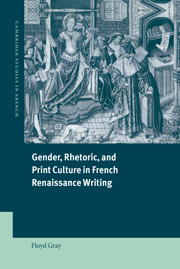Chapter 2 - Irony and the sexual other
Published online by Cambridge University Press: 22 September 2009
Summary
Misogynistic discourse, as we have seen, assumed many different shapes and styles in Renaissance texts. A subject for polemics in the tracts and treatises of the Querelle des femmes, misogyny becomes the pretext around which Rabelais revolves the fiction of Panurge's matrimonial quest in the Tiers Livre. In both instances, the role of rhetoric is instrumental in initiating and articulating the topic of the nature of women and whether or not man should marry: either as a thesis for general debate, as in the Querelle des femmes, or as an hypothesis, dealing with a particular person in a particular circumstance, as in Rabelais. The doubts concerning the status of women and marriage, which fueled the dialectics of the Querelle des femmes and which Rabelais transposed into narrative theme, also pervade the fictions of Jeanne Flore and Marguerite de Navarre: more as experience, however, personally grounded perhaps, but portrayed ironically, as part and parcel of the female condition.
So far we have looked mostly at the way in which men write about women. Here we will examine more closely the way in which women write about women. First, we will be concerned with depictions of female sexuality in Jeanne Flore's Comptes amoureux and, more particularly, with the role of irony in the shaping of character identity and intended meaning; secondly, with women and the dramatic, sometimes tragic, inadequacy of their ability to communicate with men, as played out in the tenth story from Marguerite de Navarre's Heptaméron.
- Type
- Chapter
- Information
- Publisher: Cambridge University PressPrint publication year: 2000



